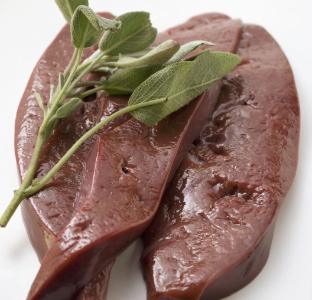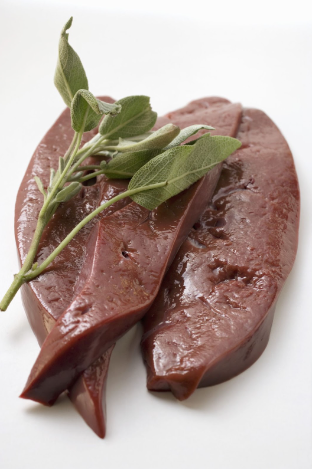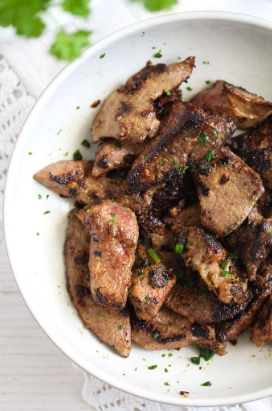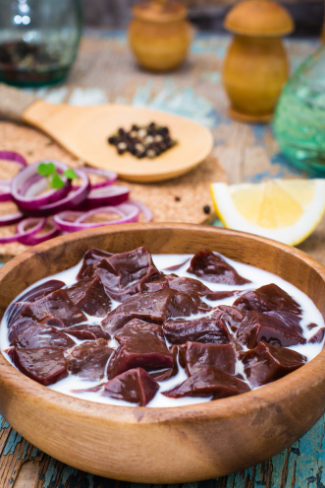
Health Benefits of Eating Liver
Ok I know… a lot of you will be like what?! Eat liver?? I do enough detox and eat healthy etc..
While I am so tremendously proud of everyone for juicing, taking their supplements, exercising, drinking lots of clean water etc.. I also want you to try eating liver!
Health professionals (from google) say that you should have a liver steak no more than twice a week.
Let’s talk about its benefits. Buckle up ladies and gents.. there’s a lot (which is so exciting)
Liver Might Support a Positive Mood and Aid Cognitive Performance
 How might eating liver help the brain?
How might eating liver help the brain?
The liver is packed with many nutrients that support emotional health, cognitive function, and also delivers nutrients and oxygen.
Choline is the front runner for nutrients associated with brain health and a single 3 oz serving of liver (about the size of a deck of cards) has almost all the choline you need for the day
Choline is so imperative for a healthy, functioning brain that deficiencies are associated with the most common form of dementia, Alzheimer’s disease.
The brain relies on oxygen and nutrients via the cardiovascular system which is made up of veins and arteries that act like highways to the brain and other parts of the body. When arteries start to build up plaque, brain function can suffer. In fact, diabetes and Alzheimer’s have such a close relationship, some experts call Alzheimer’s type 3 diabetes or diabetes of the brain. Liver also contains copper, iron and selenium – three additional nutrients required for optimal brain function. Iron is the most common micronutrient deficiency in the world. Iron is required for the synthesis (creation) of neurotransmitters and it helps prevent oxidative damage to the tissues of the brain. So if you’re someone that always has low levels of iron in your labs then incorporating liver in your diet might be your solution!
Liver May Reduce Toxic Load
Forget juice cleanses. Liver may be a better detox plan. Why? The answer is molybdenum.
Molybdenum is a trace essential mineral found in high amounts in organ meats, especially liver.
Eating liver is certainly not as pretty as the rainbow array of perfectly filled detox juice bottles but the proof is in the pudding! A little over an oz of liver provides the entire RDA for molybdenum.
How does it work? It acts as a coenzyme supporting the conversion of sulfites to sulfates and supporting the metabolism of medications and alcohol. The buildup of sulfites is toxic to the body and too much can be dangerous
Liver May Support General Health & Wellness
 It may come as a surprise but about 70% of your immune system lives in your gut (*).
It may come as a surprise but about 70% of your immune system lives in your gut (*).
Beef liver has protein, vital for maintaining the lining of the digestive tract (itself a muscle). But beyond that, it has three amazing nutrients that boost the immune system to prevent colds and other common infections – vitamin C, vitamin A and zinc.
Most people already know about vitamin C and zinc but vitamin A is no slouch! In fact, vitamin A has held the title of the “anti-infective” vitamin for last century because of its importance in normal immune functioning (*).
The gut is one of the body’s primary barrier tissues, protecting our vital organs from viruses and bacteria. The lining of the digestive tract relies on vitamin A to create cells that make up the tissue as well as the mucous they produce (*).
And it’s not just the gut – the tissues that line our airways rely on vitamin A as well. These tissues are the first line of defense for keeping out harmful substances like some types of bacteria and viruses.
The organs of the immune system need a constant supply of vitamin A to produce cells that help to fight off infections in the body. Research shows that vitamin A reduces infection and death of many serious illnesses including tuberculosis, pneumonia, measles, and malaria (*).
So just know, on top of everything else you may do to prevent a cold or to get over it, make sure to add liver to your diet!
Not only is eating liver good for you, it’s also tasty too! Here is a recipe that is easy to do and will walk you step by step.
The Offal Truth:
While many people assume that plant-based foods: vegetable and fruits are the most nutrient dense foods on the planet, I think most would be surprised to learn that organ meats (also called offal) actually far surpass most plants for nutrient density and at the top of that list is liver. Organ meats contain some of the most highly prized nutrients in concentrations hard to find anywhere else. This is why predatory animals eat it first, instinctively knowing that organ meats are the densest source of nutrition and why it has been so highly celebrated throughout history. Prior to modernized culture and our industrialized food systems, traditional food cultures generally ONLY consumed the organ meats, the lean muscle meat that we consume today was thrown away or used to feed other animals. In general, organ meats are between 10 and 100 times higher in nutrients than corresponding muscle meats.
All that being said, none of this is to at all say that fresh produce isn’t of equal importance. Fruits and vegetables are rich in phytonutrients like flavonoids and polyphenols that aren’t found in high concentrations in meats and organ meats, so it’s just as vital to include an abundance and array of fresh produce as a significant part of your diet. Balance is key!
A few more benefits about liver:
Quality Grass-fed Liver Provides:

- An excellent source of high-quality protein
- Nature’s most concentrated source of vitamin A
- All the B vitamins in abundance, particularly vitamin B12
- One of our best sources of folic acid
- A highly usable form of iron
- Trace elements such as copper, zinc and chromium; liver is our best source of copper
- Three ounces of quality beef liver contains almost three times as much choline as one egg
- CoQ10, a nutrient that is especially important for cardio-vascular function
- A good source of purines, nitrogen-containing compounds that serve as precursors for DNA and RNA
- It also contains a mysterious “anti-fatigue factor,” making it a favorite among athletes
Nutrient Density
This is the big one folks. Organ meats are some of the most concentrated sources of almost every key nutrient needed for health and wellness. You can basically think of them as meat multivitamins. Organ meats are loaded with B vitamins including B1, B2, B6 and B9. Kidney is particularly high in B12, Selenium, Iron, Copper, Phosphorus and Zinc. Liver has the highest amount of preformed Vitamin A, which makes it more bioavailable, of any food source and is also high in Vitamin D, copper, potassium, magnesium, phosphorus, manganese and iron. Adequate intake of these micronutrients, especially the antioxidants like vitamin A have been linked to lower markers in oxidative stress, muscle damage and inflammation in athletes which translates to better recovery.
How Much Liver Should You Eat?
A good recommendation for liver is one 100-gram serving of beef, lamb, bison or duck liver (about 4 ounces) once or twice a week, providing about 50,000 IU vitamin A per serving. Chicken liver, which is lower in vitamin A, may be consumed more frequently.
If you aren’t quite ready to venture into the world of eating liver, then I suggest high-quality liver supplements. When looking for liver supplements, you want to make sure it’s from 100% pasture-raised animals — as mentioned above when buying the actual liver itself. You can get it in powder, tablet or capsule form. (But challenge yourself! Expand your food palette!)
A high-quality liver supplement in its purest, most natural form basically works as a multivitamin, plus a B complex, in capsule or tablet form. It’s a great supplement for those who struggle with anemia, low energy levels, adrenal fatigue, thyroid issues, autoimmune disease, poor cellular function and even cancer.
 Don’t knock it until you try it! You might love how you feel by adding this to your diet once or twice a week!
Don’t knock it until you try it! You might love how you feel by adding this to your diet once or twice a week!
Enjoy!
